










The Director-General of the World Trade Organisation (WTO), Dr Ngozi Okonjo-Iweala, has appealed to the government to formally accept and ratify the organisation’s Agreement on Fisheries Subsidies which was adopted by consensus at the WTO's 12th Ministerial Conference (MC12) in June last year.
The agreement, she said sets new binding and multilateral rules to curb harmful subsidies, which are a key factor in the widespread depletion of the world's sh stocks.


With about 12 million people in Africa feeding o the gains of shing, she said it was important that African countries immediately rectify the agreement to help manage its sh resources.
Ms Okonjo-Iweala made the appeal on Tuesday when she called on the Ministry of Trade and Industry as part of her rst o cial visit to Ghana, since taking o ce on March 2021. Her African tour initially was expected to take her to ve other countries aside Ghana, after next stops to Cote D’Ivoire and Kenya, she will y back to Geneva, Switzerland before coming back to continue the tour.

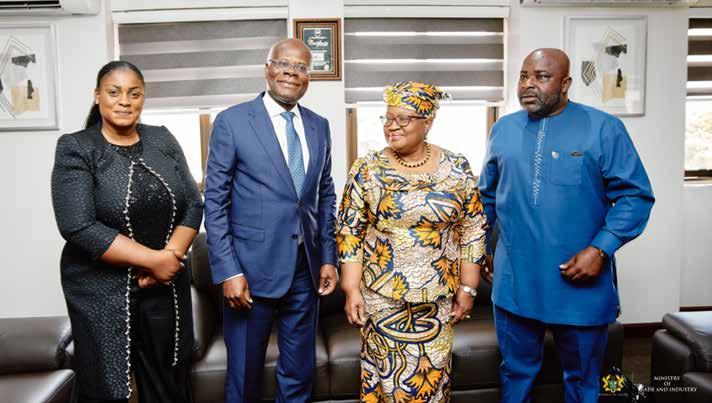
According to her, she expects Ghana to expedite the rati cation by June this year even though the deadline given to member countries is February next year where the 13th WTO Ministerial Conference (MC13) will take place in the week of 26 February 2024 in Abu Dhabi, United Arab Emirates (UAE).
“One of the things I am going to ask your excellency and Mr. President is that Ghana should ratify the agreement as soon as possible, if you ratify it there is also a fund called the Fisheries fund -we are raising US$20m and already US$7m has been pledged to help developing countries strengthen their management capacity to manage their sheries. Many of our countries need strengthening.”
The Agreement prohibits support for illegal, unreported and unregulated (IUU) shing, bans support for shing over shed stocks, and ends subsidies for shing on the unregulated high seas.
“I want African countries to ratify this agreement faster, so Ghana can set an example and I hope Minister can help so by June, Ghana rati es” she added.
The Minister of Trade and Industry, Kobina Tahir Hammond, on his part indicated that government is conscious of the agreement and is making e orts to get it rati ed in good time to enable the country access portion of the WTO's US20m dollars sheries fund to assist developing countries.
“We will do our best, Ghana takes seriously its responsibilities with these organisations and if there is this matter to recognize and ensure that e ective rati cation to ensure a smooth process, we assure you will we will do our best, but as it is in our country we will have to rst ratify and go into our incorporation of rati ed document into our law for it to become e ectively operational. The minister of sheries will be noti ed about it, we will go the president and discuss it with him, I am sure it will be rati ed in good time for the next meeting.” the minister said.
Mr. Samuel Quaatey, technical advisor at the Ministry of Fisheries and Aquaculture said the country js at the "planning stage and undertaking stakeholder engagement " before it will be drafted and sent to Cabinet before onward transfer to parliament for approval.
However before all these ne details are e ected, he disclosed that amendment needs to be made to the country's Fisheries Act to be in tandem with WTO's Fisheries Subsidies.
The Fisheries Subsidies when rati ed will help prevent over-exploitation and illegal vessels charting on the country's oceans.
There are 44 African countries who are members of the World Trade Organisation, with its purpose being the guardian of rules on how private sector trade with each other.
support from the WTO for its implementation through the WTO’s “Aid-for-Trade” initiative and the e ective imple-mentation of the WTO’s Trade Facilitation Agreement (TFA). He speci cally called for addi-tional ows of Aid for Trade from bilateral, regional and multilateral donors to support requests for trade-related capacity building from bene ciary countries, He also encouraged the mainstreaming of trade into national development strategies by partner countries; and support for improved ways of monitoring and evaluating the initiative with a view to seeking enhanced implementation.
On her part, the Director General, H.E. Dr. Ngozi Okonja-Iweala, maintained that the reforming the WTO’s adjudicating system remains her priority, and explained that there are two tiers to the dispute settlement system
Ghana’s Minister for Trade and Industry, Kobina Tahir Hammond, is calling for an enhanced capacity for developing countries to enable them participate e ectively in WTO negotiations and thereby bene t from the Multilateral Trading System.
The minister also wants the restoration of a fully functional two-tier dispute settlement mechanism -Panels and the Appellate Body to give the multilateral trading system (MTS) the needed predictability and certainty. Additionally, he is pressing for improving the transparency of governments' trade measures, especially as it pertains to export prohibitions and restrictions as witnessed during the height of the COVID crisis, As part of the measures to reform the Organisation, the minister is again advocating positively reviewing the “special and di erential”
treatment for developing countries and ensuring that existing exibilities in the Agreement on Agriculture, especially those pertaining to Article 6.2, are fully preserved to help confront the challenges of food insecurity and, reinvigorating the WTO's negotiating function. The above raft of measures are the proposals the Minister is making as the Organisation prepares to hold its Thirteenth Ministerial Conference (MC13) in Abu Dhabi in February, 2024.
Mr K.T Hammond made the proposals when he met with the Director-General of the WTO, H.E. Dr. Ngozi Okonja-Iweala, on the occasion of her working visit to Ghana as part of her maiden African tour which includes countries like Cote d’ Ivoire, Senegal, Kenya, Tanzania and Rwanda. Thanking the Director General for choosing Ghana as her rst point of
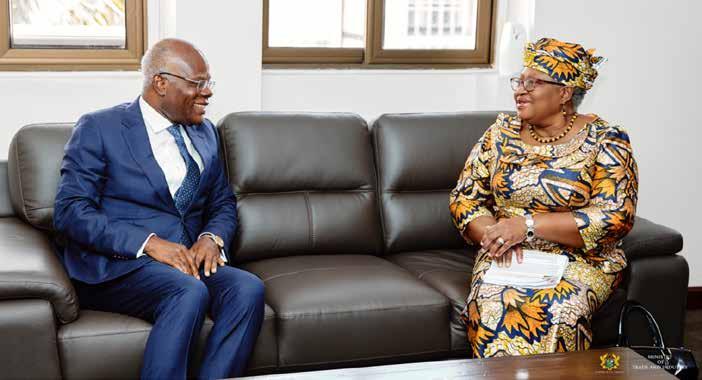
call on her African tour, the Minister noted that the decision reinforces Ghana’s credentials as the centre of African Commercial Diplomacy, in view of Ghana’s hosting of the Secretariat of AfCFTA.
He congratulated her for being the rst African, and the rst woman, to assume the position. He applauded Dr. Ngozi for the positive signal that her occupation of the role of Director General of the WTO conveys to the many young women and girls of Africa. Recalling the support that Ghana, then as Chair of the Authority of ECOWAS Heads of State and Government, o ered for her to assume her current role, he encouraged her to continue being a role model for Africa and was hopeful that her tenure will be successful in view of her quest to reform the WTO.
On the African Continental Free Trade Area (AfCFTA), he called for
“One of the things we need to reform is it dispute settlement systems, it has the panel level – where you bring your case and is judged and the second one of the appellate body where when you feel aggrieved you bring it and they handle it, but the appellate body is not functioning be-cause we do not have enough judges, but we are working at reforming it. It is on the agenda for the 13TH Ministerial conference and Ghana can really help by putting its weight into insisting that work should continue at WTO so we reform this system by the time we get to the Ministe-rial,” she said.
The World Trade Organisation (WTO) was established in January 1995 as an Intergovernmen-tal Organisation to regulate international trade with its headquarters in Geneva, Switzerland. It has a mem-
By Eugene DaviesThe CEO of American International School, Mrs. Adelaide A. Siaw-Agyepong, has observed that Africa needs people who are sustainable development oriented to transform the continent.

According to her, the changing world needs people who are analyti-
cal in view and poised in thoughts to make an impact on this world.
Speaking on the topic “Rising to Africa’s education challenges and opportunities post COVID-19 pandemic” at the 2023 edition of the Africa Development Conference organized by the African Caucus of
the Kennedy School of Law and Harvard African Law Association, Mrs. Siaw-Agyepong noted that the changing world does not need people who have mere knowledge and can regurgitate principles on the internet through multiple search engines and can perform the same thing.
“We need persons who are aligned
with sustainable development, responsible business conduct, and laced with humanity because knowledge that does not consider the survival of humanity and the generations to come are as treacherous as no knowledge,” she stressed.
She explained that, as such “a
We need sustainable orienteddevelopmentpeople to transform Africa – Adelaide Agyepong
wholistic education is needed and is one that uses knowledge to solve every day problems, recognizing the survival of humanity as dependent on the survival of one and all and works towards improving our individual and collective lives”.
“The world needs people who are ready to learn unlearn and relearn” she stressed.
Touching on how private schools in Ghana adapted and mobilized resources to aid teaching and learning in the educational sector during the COVID-19, Mrs. Siaw-Agyepong observed that during the COVID-19 pandemic, the private schools had to quickly adapt and mobilize resources to aid teaching and learning.
She added that most private schools transitioned to online learning platforms by creating online learning platforms to provide students with access to learning materials and resources
from home. “These platforms often included features like video lectures, interactive quizzes, and virtual classroom discussions,” she added.
She also noted that private schools and educational companies provided students with learning materials like textbooks, workbooks, and worksheets to enable them to continue learning at home. “Some also provided technology devices like laptops and tablets to students who did not have access to them,” she added.
During the period also, some private schools and educational companies provided training for their teachers to enable them to adapt to the new online learning environment. This training often included how to use online teaching tools, how to conduct virtual classroom discussions, newsletters and how to provide feedback and assessments online. This improved communication.
“Private schools and educational companies invested in technology to ensure that students had access to the necessary devices and internet connectivity. This often-included purchasing laptops, tablets, and other devices for students and providing internet connectivity to those who did not have it” the CEO of American International School.
Answering a question on what changes American International School undertook to ensure that learning continued? She explained that, when it was becoming clearer that a lockdown was imminent, AIS put in place a Covid 19 taskforce which brainstormed and discussed strategies to continue teaching and learning in case that happened.
“This reinforced what we believed already. We believe students should take ownership of their learning. Hence, we constantly o er professional development to our teachers
to deliver inquiry-based/ researched-based models of education. The combination of this and hybrid learning means we were ready to transition to an online classroom when needed,” she stated.
The Africa Development Conference is a student-led event that convenes academia, students, and practitioners to highlight and explore critical issues related to the African continent’s development. This year’s took place between the 15th - 16th of April, 2023, at the Harvard Law School, Cambridge, Massachusetts.
The theme for this edition is “Reimagining Africa’s Growth on Our Terms.”
The Conference had panels, reside chats, and keynote speeches on topics including how Africa can thrive in international trade, challenges and opportunities in transitioning to a green economy, the role of creative arts in development, the Africa we want, and other engaging topics.
ment for the industry to thrive. These interventions have helped to expand and boost the capacity of players in the industry, leading to the sector’s expansion as well as healthy competition among industry players. Support from corporate organisations including this prestigious awards scheme has contributed signi cantly to driving innovation and creativity among players in the industry thereby contributing to the successes of the beverage industry. However, it is crucial for more corporate organisations to throw their weight behind the industry for sustained e orts and greater achievements.”
The 7th edition of the just-ended Ghana Beverage Awards held at the plush Kempinski saw over 20 indus try players being honoured for their ingenuity and hardwork for the year under the review.
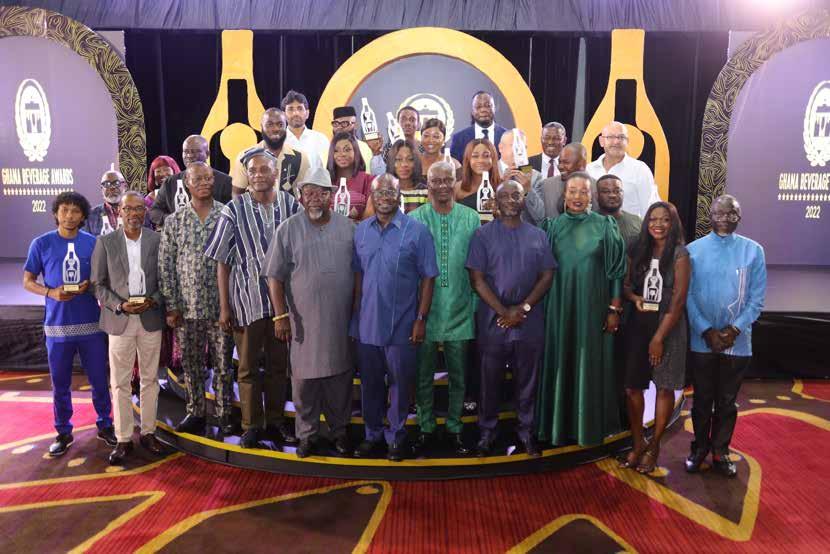
Beverage companies that were recognized included Acadia Industries Limited, Kasapreko Company Limited, AA Food and Beverages, among others.
Tampico carried the night as the ultimate winner, emerging victorious in the ercely competitive Product of the Year category.
Mensdo Bissap and Vitamilk’s Fills Good, Anywhere Anytime Campaign emerged winners for the nouvelle Indigenous Beverage Brand of the Year and Beverage Campaign of the Year categories.
Speaking at the event, Chief Executive O cer for Global Media Alliance, Ernest Boateng,
scheme’s commitment to supporting the industry.
“The beverage industry is a key driver in the development and sustenance of the nation’s economy. It is a huge revenue-generating industry, which supports the country in employment creation, service delivery and more. Cognisant of this fact, it is always our delight to provide an avenue as this which gives room for interaction and networking among stakeholders of Ghana’s Beverage industry while at the same time providing the opportunity for industry players to share ideas relevant for the growth of their industry,” he said.
He congratulated the winners of the various categories describing each win as “well deserved “and one that
brings the scheme closer to its vision of helping grow our local beverage brands and subsequently widening their footprint on the international market.
Taking his turn, Executive Director of the Chartered Institute of Marketing, Mr. Kwabena Agyekum noted that the interventions of marketing practitioners have over the years contributed signi cantly to the growth and expansion of the beverage industry while calling for concerted e orts from corporate organisations for a sustained drive of innovation and creativity among beverage industry players.
“Recognizing the critical role of the beverage industry in the nation’s development, marketing practitioners have always led advocacies for the industry and worked with government and relevant stakeholders to create an enabling environ-
GBA is organized under the theme “Inspiring Excellence in Ghana’s Beverage Industry”. In a lead up, nominations were opened to allow the public and beverage companies to nominate their favourite beverage brands. Closure of the nominations ushered organizers into the voting phase which allowed the public to vote for their favourite brand in the Product of the Year Category. This year’s edition of the GBA witnessed erce competition at the voting stages with a 20% increase in voter turnout compared to the previous edition.
Ghana Beverage Awards is proudly supported by the Food and Beverage Association of Ghana (FABAG), Consumer Protection Agency (CPA), Food Research Institute (FRI) under CSIR, Perception Management International (PMI), Ministry of Trade and Industry, Ministry of Tourism, Arts & Culture and the Ghana Tourism Authority (GTA). Its media partners are Citi FM, Happy FM, YFM, eTV Ghana, Business and Financial Times, Daily Guide, njdjlive.com and Ghanaweb.
 By Benson A ul
By Benson A ul
Oil revenue watchdog Public Interest and Accountability Committee (PIAC) says there is the need for the government to attract investors in the upstream petroleum sector to reverse the steady decline in oil production in the country.
The committee in its latest annual report urged government to speed up the sustainable development of the country’s petroleum resources as well as to ensure early completion of ongoing project as the country’s crude oil production has been declining for three consecutive
years.
PIAC, which has been monitoring government in the last decade over how it spends the country oil revenue disclosed in its 2022 annual report that a volume of 71,439,585 barrels was produced in 2019, but declined to 66,926,806 barrels in 2020, representing 6.32 percent.
It further declined to 55,050,391 barrels in 2021 (17.75%) and then to 51,756,481 barrels in 2022 (5.98%).
The average decline over the three-year period stood at 10 percent, PIAC said.
worry over this development as they believe the decline in oil production might a ect the and funding and development of several government projects and programmes.
For instance, government agship programme Free Senior High School is heavily reliant on oil revenue and the continuous decline of oil production might a ect government’s spending on the programme.
President Akufo-Addo during the launch of the policy in September 2017 said his government will invest
revenues from oil into one of the most ambitious social programmes in the country’s history.
According to him, Free SHS is ensuring that the country’s oil revenues are being equitably distributed to the people—and not ending up in the pockets of a few.
It is estimated that half of oil revenue goes into funding free SHS, for example in 2020 about 53percent of funding allocated for the policy was from petroleum revenue.
However, analysts believe that government should diversi ed fund-
Farmers across the country have had to deal with a very harsh dilemma especially with the hike in prices of farming inputs.
One of such produces creating this limbo is fertiliser. This year alone, some say the prices of inorganic fertiliser has more nearly tripled leaving them with very few options. A major cause, the ongoing war in Europe between Russia and Ukraine which is a ecting key agricultural value chains. Consequently, prices of compost are at an all-time high. Experts earlier pointed to Covid-19 impacts and its accompanying volatility as the cause.
However, the onset the war between the two counties further disrupted the value chain as Russia took drastic measures in response to international sanctions slapped at them.
Russia urged its fertilizer manufacturers temporarily stop exports of their products amid shipping concerns and later announced more export restrictions to secure su cient supply for domestic farmers.
This means, global prices surged to record levels.
Geographically, this concern looked like nothing for Ghanaians to be worried about.
But this development, in addition
to nancial sanctions, and the instability in oil and gas prices are driving up cost leaving a ripple e ect.
The World Bank has already indicated that global fertiliser prices had risen 30% by early 2022 on the heels of an 80% hike in 2021. Crop farmers are feeling the pinch as shortages now threaten their livelihood.
Joseph Wilson Kwashie is a farmer in Ashaiman. He is also secretary to a body of about 107 irrigation farmers in his locality. This means, aside from his, Joseph sees the challenges of each farmer as they come to his desk for attention.
He explained that the past year has been a trying one for his fraternity. “The shortage has a ected us directly because normally you go to buy and you won’t get some. Meanwhile, the price too has tripled.
Last year, we bought a bag at around Ghs100 or Ghs120 whereas at the moment, a bag is going for GHS350. Some are going for Ghs450,” he said.
But there is a silver lining in the organic alternative. The development is nudging more farmers towards organic fertlisers.
Joseph says they are cheaper, last longer in the soil and produces more yields without health complications.
“When we apply the organic fertiliser it will stay longer. It will help us get more yield which is very good economically… We de nitely want to shift to organic fertiliser. Inorganic fertiliser depends on the use of natural gas and the mining of nutrients such as phosphorus that will be exhausted by the end of this century at the current pace of extraction.
This only predicts a gloomy outlook for the inorganic nutrients for which reason local farmers need to plan for the long-term.
Asase Gyefo Organic Fertiliser sits at the forefront of providing solution to this problem.
Kelly Ampofo is greenhouse farmer in Accra. He says using a the Asase Gyefo has helped him “save expenses and cost”
“Looking at the yield that we are getting now, comparing that to before, the Asase Gyefo has helped us a lot. You can see the leaves, the fruits, there is a big di erence. The taste is very good.”
According to Kelly, he put the organic fertiliser to the test by using just 8 bags to ascertain the results compared to its inorganic counterparts.
“So we tried Asase Gyefo here which was only 8 bags. The growth at this side [organic fertliser] was impres-
sive as compared to that side. So when it started fruiting, even at this side, we have harvested twice. The other side [inorganic fertliser], we have harvested just once,” he explained.
The greenhouse farmer says even through this was not his rst organic product, its output is good for business.
Due to its high nutrient value, containing double amounts of Nitrogen and Phosphorus and Potassium, Asase Gyefo makes fruits and vegetables grow faster.
Researcher at the University of Ghana’s Department of Crop Science, Dr Naa Lamle Amissah’s research group is even looking at the bigger picture of how organic compost can improve food security in the future and sees the global crisis as the wake-up call.
“It is happening everywhere in the country. I mean, there's the di culty in getting fertilisers, and over dependence on inorganic fertilisers is what is resulting in all this. So we de nitely have to start looking at more sustainable ways of getting fertiliser or getting making sure that that lands, our crops are fertilized. And another aspect, one thing that we can look at is organic fertilisers and we need to start developing them that a lot more or paying more attention to that and compost.”
The horticulturist explained that if these alternatives are not explored “the soil is going to su er.”
“And once the soil su ers, they don't have enough nutrients, etc, to be able to produce the crops that you're looking for. De nitely, it will it will a ect our yields drastically and we will start seeing signs of those.”
Dr Amissah’s group conducted some studies on the Sa sana’s Asase Gyefo Premium Fertiliser.
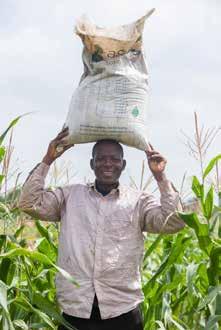
“We looked at a few vegetables, one being eggplant, we looked at sweet sweet pepper, and we looked at

looking at that in comparison with the others on the market and their yields, theirs came up tops with you getting up to 20% increase in your yields with their Asase Gyefo Premium compost,” she said.
The researcher see this as a good sign for farmers who are looking to make the switch and or food security as a while.
“It means that I mean if you're able to use their fertiliser, I mean you de nitely will have a lot more nutrients within your soil it enriches the
soil water holding capacity of the soil is increased by using compost in general. But if you have compost that is rich in some of these nutrients that will help or aid with production. That de nitely is a plus.”
The production of Asase Gyefo Organic Fertiliser is based on the concept of recycling, reuse and recovery of nutrients and goes without the use of natural gas.
According to Senior Manager of Sa sana Ghana Ko Boateng, “we collect waste from the local food markets and local industries and use it as a resource for the production of organ-
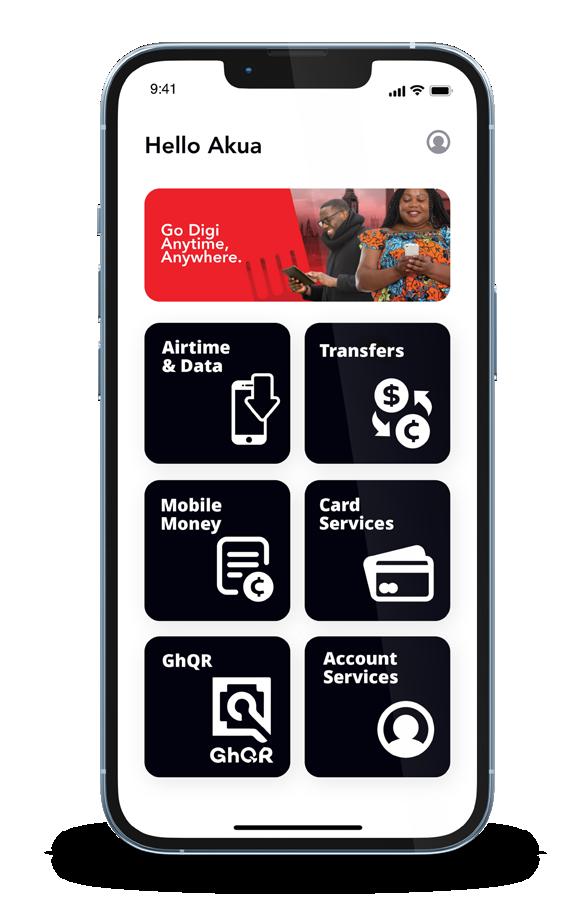
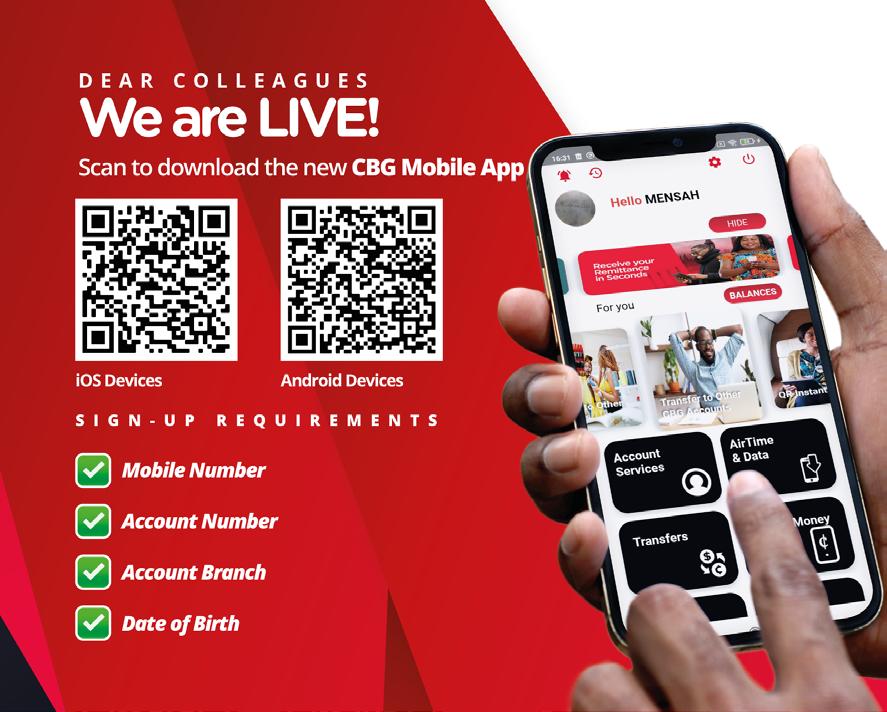
ic fertiliser.”
“Key ingredients and nutrients such as nitrogen, phosphorus and potassium, are recovered and reused from the waste through a process of composting. The result is a highly nutritive premium organic fertiliser which is good for the soil quality, the plants and the planet.”
Therefore between a global grapple with agricultural supplies and a beckoning food crisis, natural fertilisers may just be the way to go, and Sa sana’s product is ready to make that transition a seamless one for farmers.
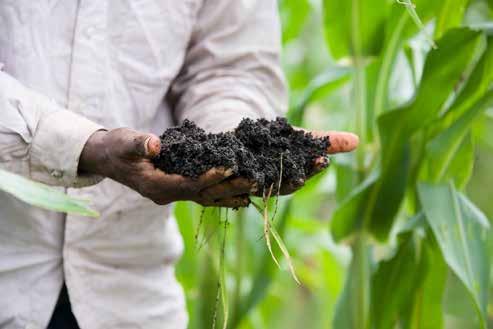
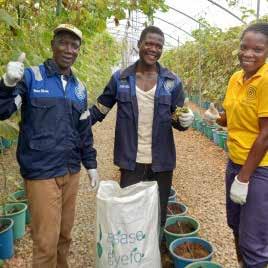
planting exercise at the Achimota Forest to commemorate this year’s Earth Day which falls on April 22, under the theme, “Investing in our planet”.
The aim behind the initiative under the UBA Foundation is to contribute to the bank’s climate action to o set its carbon emissions and reduce the overall environmental impact of its operations while actively engaging sta members to play a part in ensuring a greener and more sustainable

Commenting on the initiative, Head of Marketing and Corporate Communications at UBA Ghana, Henry Nii Dottey said, “As a sustainable organisation, UBA is delighted to work with the Forestry Division, Greater Accra to preserve Ghana’s forestry in a collective e ort.
“Beyond building an undisputed leading and dominant nancial services institution in Africa, UBA Ghana is committed to supporting the government’s e orts towards
ment Goals (SDGs) as key pillars of the bank’s Environmental, Social, and Governance (ESG) agenda and becoming a net zero bank in its operations” he said.
Mr Fii Smith, Manager at the Forest Division, Greater Accra who briefed the team and supervised the tree planting also commended UBA for the positive environmental act. He urged the team at UBA to take interest in monitoring the growth of the trees and also partake in the tree planting exercise in June.
The UBA Foundation is committed to promoting sustainable development through various initiatives, including education, empowerment and environmental conservation.
The tree planting exercise at Achimota Forest is one of several activities planned by the UBA Foundation to mark World Earth Day.
The event was a reminder that small actions can make a signi cant impact on the environment and the community. UBA Ghana encourages everyone to play their part in

The 2003-year group of Achimota Basic School has marked their 20th anniversary of leaving the school with a donation exercise on Thursday, 20th April 2023.
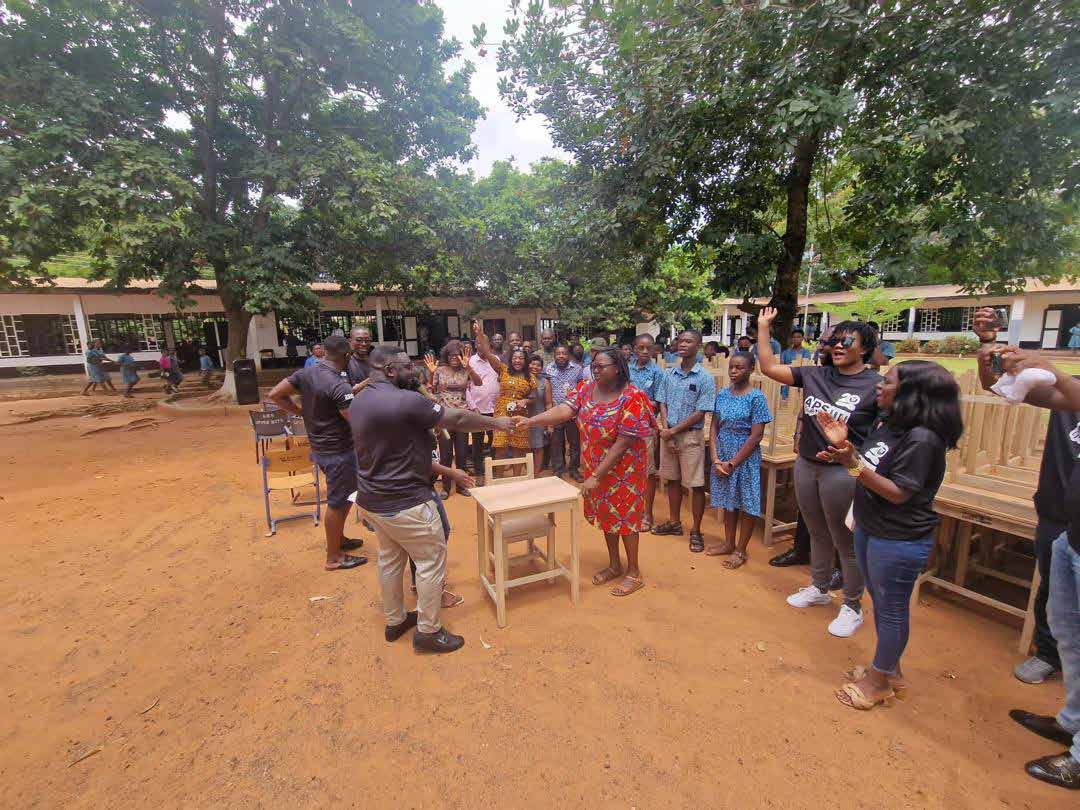
They presented desks, stationery items among others to the JHS Department of the school. The gesture of equipping the JHS classrooms to a modern state was aimed at giving back to the school for
Grace Gyimah, Alumni and Medical Director of Sonotech Medical Centre remarked that “Our constant interactions with the Head Mistress, Mrs. Kwarteng brought to bear some of the needs of the school including the lack of desks. As a formidable year group, we are delighted to have come back to support with these desks and transform the learning space for the JHS
opportunity to call upon other year groups to also support their alma mater.
In her acceptance speech, Mrs. Kwarteng thanked the old students for their e orts and benevolence, and advocated the need to have other year groups emulate their gesture.
The Executive Board of the 2003-year group said, “the year group is


committed to promoting a good studying condition for pupils of our alma mater, therefore we are willing to embark on other projects to help the school. We call on other year groups to support this positive venture.”
Beyond the donation exercise, the old students visited the boarding houses and interacted with the students. The visit ended with the year group singing the school anthem.
KG=!-(.@/=!FG:*)1@/G!L).9(1! %&%3 N>4B6 ?O=9(1!,(:@<@1!P6!+,-Q! R/8$!%&%% B4>6 %&%%!?O=9(1!,(:@<@1!L).9(1!P6+,-Q S4S6 -OH*@<!,(H1!PH@**@/G!+TUQ!! R/8$!%&%% C5C45 ,(H1!1/!+,-!')1@/! R/8$!%&%% B34C6
)*2!.&+$0.(*&0('"(-
L2(!+2)G)!V1/<E!KW<2)G9( <*/I(=! 2@92(. :/.!12( 0((E /G!12(!H)<E!/:!X.@<(!@G<.()I(I HA S </OG1(.I4 L2( +VK!Y/ZX/I@1(!FG=(W!P+VK YFQ 9)@G(= C%453 X/@G1I!P\N4B56Q!1/! <*/I( 12(!0((E )1 %$53C4C> X/@G1I$ .(:*(<1@G9 )! A(). 1/ =)1(!P]L,Q! 9)@G /:
NN4B36 L2( +VK!^@G)G<@)*!V1/<EI!FG=(W!P+VK ^FQ
*/I1! #N4#C X/@G1I!P %43N6Q!1/! <*/I(!12(!0((E )1 N$5CS43% X/@G1I$!.(:*(<1@G9 )!]L, */II /:!N#4#36
J).E(1! <)X@1)*@_)1@/G @G<.()I(= HA! N4CS6!1/!<*/I(!
12(!0((E!)1! +TUS>$%N54NS Z@**@/G$ :./Z +TUS5$NSS4C% Z@**@/G!)1!12(!<*/I(!/:!12(!X.(8@/OI! 0((E4!L2@I!.(:*(<1I!)!]L,!9)@G /:!C45C64!
L2(!0((E!0@1G(II(=!)! 1/1)*!/: 3$5#C$C&3 I2).(I! 8)*O(=!)1!+TU#$#B#$33#4NB <2)G9@G9 2)G=I$ </ZX).(=!0@12 3$5#C$C&3 I2).(I$ 8)*O(= )1 +TU#$#B#$33#4NB @G 12(!X.(<(=@G9!0((E4
+Y? =/Z@G)1(=!H/12! 8/*OZ( )G=!8)*O(! /:!1.)=(I! :/.!12(!0((E$! )<</OG1@G9!:/. %C4CB6 )G=!#N4356 /:! I2).(I!1.)=(=!.(IX(<1@8(*A4
L2(!Z).E(1! (G=(= 12(!0((E!0@12 %! =(<*@G(.I )I! @G=@<)1(=!/G!12(!1)H*(!H(*/04
=56>?&&+@A?5B&C@5&DE?&-??F (GH6DI 24?J6JK&=56>?&&&&&&&&&&&!7@B6JK&=56>?&
N#4NN !B4B>6
N4%S !C4&&6
N4SC !&4SN6
S43B S4#% !&4#56
*5?JS&6J&+L5F?D&"JS6>?B&
+L5F?D&!L46DL76ZLD6@J&C@5&-??F& (JS6JK&89M;RM8;8< J7'hKL!Y7- ]L,6
[?BD&Q&*5LS?S&(GH6D6?B&XI&'@7HV?& C@5&DE?&-??F&(JS6JK&89M;RM8;8<
Q&[?BD&\&Q&-@5BD&=?5C@5V6JK&)D@>FB /*#&0?DH5J
Y7a VY? ++?aV`+K+T ^Ja
%34SN6%S4>363>4&&6
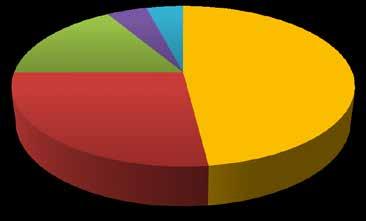

!W00(%!/&+$0.(*
L2(!Y(=@ =(X.(<@)1(=!Z).9@G)**A )9)@GI1!12(!dV,! :/.!12( 0((E4 F1!1.)=(=!)1 +TUN&4B##Nbe$!</ZX).(=! 0@12! +TUN&4B3B>be!)1!0((E!/X(G$ .(:*(<1@G9!0b0 )G=!]L, =(X.(<@)1@/GI /:! &4! )G=! %N4S#6! .(IX(<1@8(*A4 L2@I!</ZX).(I!0@12!]L, */II /:! NC4CC6 )!A().!)9/4
L2(!Y(=@ I1.(G912(G(= Z).9@G)**A )9)@GI1! 12(! +?- :/.!12( 0((E4!F1 1.)=(= )1 +TUN34C>&Cbf$ </ZX).(=! 0@12!+TUN34CB&&bf!)1!0((E!/X(G$! .(:*(<1@G9!0b0 9)@G )G= ]L, =(X.(<@)1@/G /: &4&56! )G=! %#4&56!.(IX(<1@8(*A4!L2@I </ZX).(I!0@12!]L,! =(X.(<@)1@/G /:!N&4B56!)!A().!)9/4

[?BD&Q&*5LS?S&(GH6D6?B&XI&'L7H?&C@5& DE?&-??F&(JS6JK&89M;RM8;8<
?`--$!34>C6 +`Fa$!34CC6
L2(!Y(=@ )*I/!I1.(G912(G(= )9)@GI1 12(!KO./ :/.! 12(!0((E4!F1 1.)=(=!)1!+TUN%4&N3Bbg$! </ZX).(=! 0@12!+TUN%4&%N%bg!)1!0((E!/X(G$!.(:*(<1@G9!0b0 9)@G )G=!]L, =(X.(<@)1@/G /: &4&S6 )G=! %34>56 .(IX(<1@8(*A4 L2@I!</ZX).(I!0@12!]L,! */II /:! N&4BC6!)!A().!)9/
L2(!Y(=@ )9)@G! )XX.(<@)1(=! )9)@GI1!12( Y)G)=@)G! ,/**). )1!0((E (G=4 F1!/X(G(= )1!+TU>4N5BSbYe HO1! <*/I(=!)1 +TU>4&>S>bYe$ .(:*(<1@G9 0b0 9)@G! )G= ]L,! */II /: N4NC6 )G=! %N4>%6 .(IX(<1@8(*A4!L2@I! </ZX).(I!0@12!]L,! =(X.(<@)1@/G /:! NC4%&6!)!A().! )9/4
-??F7I&"JD?5XLJF&1@5?6KJ&(Y>ELJK?&0LD?B
!H55?J>I&
(Y>ELJK?&0LD?B^&3ELJL& !?S6&AB&)?7?>D?S& !H55?J>6?B
N$C>>4%5 !N54#S6 L).9(1!</8(.)9(!.)1@/ N43& N4&> G) J)1O.@1A!</8(.)9(!.)1@/ N43S N4N3 G) ?@=!b!Y/8(.!.)1@/ N4&& N4&& G) "#$%&'(!2+,.!#3!)*+,+
/*#&=?5C@5VLJ>?&@C&DE?& 3ELJL&!?S6&LKL6JBD& )?7?>D?S&!H55?J>6?B
!2++2#"*/&+$0.(*
Y.O=(!X.@<(I!:(**!:/.!)!12@.=!1@Z(!@G!:/O.!=)AI!)I! 9./0@G9!(WX(<1)1@/GI!:/.!)!1(G12!d4V4!.)1(!2@E(! I@G<(!12(!X)G=(Z@<!)G=!)!.(<(II@/G!)1!I/Z(!X/@G1! 12@I!A().!0(@92(=!/G!/@*!Z).E(1I4 ?.(G1!:O1O.(I! 1.)=(=!)1 dVe>S43N )!H)..(*$!</ZX).(=!1/!dVe>C4N% )1!0((E!/X(G$! .(:*(<1@G9 0b0 )G=!]L, =(X.(<@)1@/GI /: C43B6!)G=!#4BC6 .(IX(<1@8(*A
+/*=!X.@<(I! =./XX(= 1/!I(11*(!;OI1!)!I2)=(!H(*/0! 12(!e%$&&&!Z).E!)2()=!/:!)!E((G*A 0)1<2(=! ^(=(.)*!'(I(.8(!=(<@I@/G!/G!d4V4!@G1(.(I1!.)1(I4 +/*= I(11*(=!)1 dVe%$&&%4&&$ :./Z dVe%$&NN4B& *)I1! 0((E$ .(:*(<1@G9!0b0 =(X.(<@)1@/G )G= ]L, )XX.(<@)1@/G /: N4N36 )G=!>43B6!.(IX(<1@8(*A4
32'(0%+(%*&)(!W0"*"()&+$0.(* +/8(.GZ(G1!.)@I(=!)!IOZ!/:!+TU%$C3&4B% Z@**@/G! :/.!12(!0((E!)<./II!12(!BN ,)A$! N>% ,)A )G=!3S# ,)A! L.()IO.A!?@**I4!L2@I!</ZX).(=!0@12! +TUN$5BN4C> Z@**@/G!.)@I(=!@G!12(!X.(8@/OI!0((E4!





L2(!BN ,)A!?@**!I(11*(=!)1! NB4>S6!X4)!:./Z! NB45#6! X4)4!*)I1!0((E!02@*I1!12(!N>% ,)A!?@**!I(11*(=!)1!! %%4C>6!X4)!:./Z!%%4#56!X4)4!*)I1!0((E4 L2(!3S# ,)A! ?@**!I(11*(=!)1! %54%S6!X4)!:./Z! %S4B&6!X4)4!*)I1! 0((E4
L2(!1)H*(I H(*/0!2@92*@921!X.@Z).A!Z).E(1!)<1@8@1A )1!<*/I(!/:!12(!0((E
L2(!X.@<(!/:!Y/</)! .()*@I(=!I/Z(!I@9G@:@<)G1 9)@GI! :/. 12(!0((E4 Y/</) 1.)=(= )1 dVe3$N5N4&& X(.! 1/GG( /G!^.@=)A$ :./Z!dVe%$B>#4&& *)I1!0((E$ .(:*(<1@G9 0b0 )G=! ]L,! )XX.(<@)1@/GI /:! S4%56! )G= %N4BS6!.(IX(<1@8(*A4
"JD?5JLD6@JL7&!@VV@S6DI&=56>?B
!@VV@S6D6?B /?L5& 24?J& -??F& 24?J -??F& !7@B? !EKO /*#&O ;9 ;9 8< 9] ;R 8< 89 ;R 8< ?.(G1!<.O=(!/@*!
PdV,bHH*Q >C4BN! >S43N! >N4SS! "C43B "#4BC
+/*=!PdV,b1!/_4Q! N$>%S4%&! %$&&%4%&! N$B5B4C&! "N4N3
[W)"%())&*(0+&21&*_(&-((.
#6A6S?JS& =LI@HD&0LD6@^& L2(!=@8@=(G=!X)A/O1!.)1@/! @I!12(!.)1@/!/:!12(!1/1)*!)Z/OG1!/:!=@8@=(G=I!X)@=! /O1!1/!I2).(2/*=(.I!.(*)1@8(!1/!12(!G(1!@G</Z(!/:! 12(!</ZX)GA4!F1!@I!12(!X(.<(G1)9(!/:!().G@G9I!X)@=! 1/!I2).(2/*=(.I!8@)!=@8@=(G=I4!L2(!)Z/OG1!12)1!@I! G/1!X)@=!1/!I2).(2/*=(.I!@I!.(1)@G(=!HA!12(! </ZX)GA!1/!X)A!/::!=(H1!/.!1/!.(@G8(I1!@G!</.(! /X(.)1@/GI4
"#$%&'(!
*--:8(;;44456,7'8-#:'<6+5	-'%98;<;<676<',<:+=#$-%+-6#5+8:
$[2W*&!"#$%
YF,7R!FG8(I1Z(G1I!a@Z@1(=!@I!)G!@G8(I1Z(G1!)G=! :OG=!Z)G)9(Z(G1!</ZX)GA! *@<(GI(=!HA!12(! V(<O.@1@(I!j!KW<2)G9(!Y/ZZ@II@/G!PVKYQ!)G=!12(! R)1@/G)*!-(GI@/GI!'(9O*)1/.A!7O12/.@1A!PR-'7Q4




0()($0!_&*($+&
R)Z(k!K.G(I1!L)GG/.
KZ)@*k(1)GG/.l<@=)G@G8(I1Z(G1I4</Z L(*k\%33!P&Q!%&!>>N!>BC5
R)Z(k!J/I(I!R)G)!`I(@ ](H/)2 KZ)@*kZ/A(H/)2l<@=)G@G8(I1Z(G1I4</Z L(*k\%33!P&Q!%#!#BB!&&SB
!20=20$*(&"%120+$*"2% YF,7R!FG8(I1Z(G1I!a@Z@1(= YF,7R!T/OI( -*/1!R/4!NSB!?*/<E!S T))1I/$!R/.12!a(9/G! 7<<.)! L(*k!\%33!P&Q!%SN5N!5&&Nb!%S!3&&!3BN5 ^)Wk!\%33!P&Q3&!%C#!#3CN KZ)@*k!@G:/l<@=)G@G8(I1Z(GI4</Z D(HI@1(k!0004<@=)G@G8(I1Z(G1I4</Z
>68&?+69'%!"#$%&'(#'()$&*$("+)$,#-&,($"./#$0##'$ -,#-.,#1$(&$-,&/+1#$2&3$4+("$5#'#,.6$ +'*&,7.(+&'$&'628$ 9'*&,7.(+&'$-,&/+1#1$&'$.'1$./.+6.06#$*,&7$("+)$,#-&,($ 1&#)$'&($%&')(+(3(#$.'2$+'/#)(7#'($,#%&77#'1.(+&'8 !"#$+'*&,7.(+&'$%&'(.+'#1$"#,#+'$".)$0##'$&0(.+'#1$ *,&7$)&3,%#)$(".($4#$0#6+#/#$(&$0#$,#6+.06#:$03($+()$ .%%3,.%2$.'1$%&7-6#(#'#))$.,#$'&($53.,.'(##18

In today's globalized world, the need for swift and secure payments of goods and services has become more important than ever.
SWIFT payments have emerged as a reliable and e cient way to make payments within and across borders, and they have become a preferred option for many consumers and businesses alike.
In 2020, the World Bank established that the implementation of the African Continental Free Trade Area (AfCFTA) has the potential of growing African exports by $560 billion while increasing Africa’s income by $450 billion by 2035. A treaty that is going to connect approximately 1.3 billion people across 55 African countries with a combined GDP of $3.4 trillion.
What is SWIFT?
SWIFT stands for Society for Worldwide Interbank Financial Telecommunication and is a network that connects banks and other nancial institutions across the world. The network provides a secure and reliable platform for the transfer of funds between banks, making it a popular choice for international payments for goods and services.
SWIFT payments, therefore, refers to an international messaging system used by banks and other nancial institutions to securely exchange sensitive payment instructions related to international trade and money transfers.
The SWIFT system uses a standard system of codes to transfer money from one country to another. Each bank or nancial institution enrolled on the SWIFT platform is given a unique eight (8) to eleven (11) character long, standard format which identi es banks and nancial institutions worldwide. Eg (ECOCGHACXXX). Some of the message codes that banks, and nancial institutions use to communicate amongst themselves are, MT103 –this is a standard SWIFT payment message, used to instruct the transfer of funds from one individual account to another. MT202 – This SWIFT message is used for bank-to-bank transfers, speci cally for covering banks. MT700 – This is a SWIFT message used for issuing letters of credit. MT199 – This is a SWIFT message used for sending a free format message. MT910 – This is a SWIFT code used for con rmation of credit. MT940 – This is a SWIFT message used for balance reporting.
Bene ts of SWIFT Payments to SMEs

Speed.
Payments made through the SWIFT network typically take only a few hours to complete, depending on the banks involved and the time zones. This is signi cantly faster than traditional methods of making payments across borders, which could take several days or even weeks to complete. The speed SWIFT payments come with is a sure way to enable our local SMEs receive and send money quickly for goods and services and increase trade volumes, free up time previously lost while waiting to con rm payments. This can be crucial for Small and Medium-Sized Enterprises (SMEs) that operate in fast-paced environments where quick access to capital can be the di erence between success and failure. For instance, a shoe manufacturing house in Accra were to buy raw materials from a leather manufacturer in Kenya, it would be able to make payment for the leather instantly on the SWIFT platform. The leather manufacturer in Kenya would receive payment into its bank account, thereby skirting currently common delays – freeing up time to respond quickly to the order from Accra.
(ii) Security.
The SWIFT network is highly secure and uses state-of-the-art encryption to protect the transfer of funds. This ensures that the transfer of funds is safe from any potentially fraudulent activity or unauthorized access. This can help to build trust between SMEs and their customers, partners, and suppliers, which can be especially important for businesses that operate in regions where fraud and cybercrime are prevalent.
(iii) Convenient and easy to use.
Local Small and Medium-sized Enterprises can initiate payments through their bank or nancial institution, and the transfer is processed quickly and e ciently. Additionally, many banks and nancial institutions o er online platforms and mobile applications that allow customers to initiate SWIFT payments from the comfort of their own homes. This can be particularly convenient for our Ghanaian SMEs that need to make urgent payments or transfers outside of regular business hours.
(iv) Access to global markets.
SWIFT connects four billion accounts across more than 11,000 institutions in 200 countries and territories to securely and con dently move value around the world. SWIFT payments can help our local Ghanaian SMEs to expand their reach beyond their local markets and tap into new global markets. This can be particularly valuable for businesses that operate in industries such as manufacturing, where entree to global supply chains and
international markets is critical. SWIFT operations in Ghana, particularly when it comes to the African Continental Free Trade Area (AfCFTA) will be very bene cial to the promotion of trade amongst SMEs in the region. The SWIFT platform would enable cross-border payments and support the African Union’s undertaking of creating a single market and trading coalition by making payment systems interconnected across the continent, thus easing the free exchange of goods and services.
Again, SMEs in Ghana are better o using SWIFT as a medium to make their advanced payments, documentary collections and issuance of letters of credit in their international trade activities. The funds allowed to be transferred on the platform to e ect payments to partners and suppliers is unlimited. Unlike the other money transfer platforms (Western Union, Unity Link, etc) which restricts the amount that can be transferred at a go.
(v) cost-e ective
SWIFT payments can be cost-e ective for SMEs in Ghana that need to make regular payments or receive payments from overseas. This is because they o er competitive exchange rates and fees, which can help SMEs to save money on currency conversion and transfer fees.
(vi) Transparency and visibility
SWIFT payments provide a high level of into the payment process in international trade. The platform provides payment pre-validation service which allows banks and nancial institutions to authenticate bene ciary account details before an international payment is sent, thereby eliminating a key point of abrasion in cross-border trade transactions. Before sending a payment, banks and nancial institutions connected onto the SWIFT network can check the validity of the bene ciary account by comparing it against SWIFT’s enormous store of transaction data. The validations are completed in real-time through APIs, and pre-validating payments will save time and reduce friction between businesses and their partners.
(vii) Highly automated
This help streamline trade transactions and reduce administrative burdens. This can be especially important for small and medium-sized enterprises (SMEs), which may not have the resources to manage complex payment processes.
Potential drawbacks
While there are many advantages to SWIFT payments, there are also some potential drawbacks to consider.
(i) compliance requirements
This is one of the main drawbacks
that pose a big challenge to the service. SWIFT payments are subject to strict regulatory and compliance requirements, which can be challenging for SMEs to navigate. This can result in delays and additional costs associated with compliance-related activities.
(ii) delays or errors in transactions
SWIFT payments may be subject to delays and errors which can impact the speed and e ciency of the transfer. It is important for customers to carefully review the terms and conditions of the transfer and to ensure that all information provided is accurate to avoid any potential issues.
(iii) complexity
This can be a potential drawback. The process of setting up and initiating a SWIFT payment can be complex and time-consuming for SMEs that are not familiar with the process. This can be especially challenging for businesses that lack the technical expertise to navigate the system and ensure that transfers are executed correctly.
(iv) limited coverage.
While swift transfers can provide access to global markets, the service is not available in all countries and regions like (Cape Verde, Libya,Angola, Burundi, Guinea, Morocco, Sudan, Russia, Iran, etc). SMEs operating in areas with limited SWIFT coverage may nd it challenging to send and receive payments through the service and this hampers the process of doing business smoothly amongst SMEs and their partners, and the supply chain process.
Conclusion
Swift transfers have become a popular option for individuals and businesses looking for a fast, secure, and reliable way to transfer money within and across borders. While there are some potential drawbacks to consider, the bene ts of using SWIFT payments generally outweigh the costs, making them a preferred choice for many customers for payments of goods and services. Overall, SWIFT payments can help SMEs in Africa to overcome some of the nancial barriers they face and enable them to compete e ectively in global markets. With continued advancements in technology and increasing global connectivity, SWIFT payments are likely to remain a critical component of international payments for years to come. The revolution in cross-border payments is accelerating, and the need for instant and frictionless transactions from one account to another anywhere in the world is greater than ever. SWIFT and its community partners cooperatively deliver this together, powering a more inclusive global economy that works better for everyone and making nancial